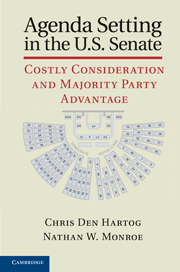Book contents
- Frontmatter
- Contents
- List of Tables and Figures
- Preface
- PART I COSTLY CONSIDERATION
- PART II SENATE PROCEDURE AND CONSIDERATION COSTS
- 4 Committees and Senate Agenda Setting
- 5 Scheduling Bills in the Senate
- 6 The Effects of Filibusters
- 7 The Disposition of Majority and Minority Amendments
- 8 Killing Amendments with Tabling Motions and Points of Order
- 9 The Effects of Amendments
- PART III TESTING THE COSTLY-CONSIDERATION THEORY
- Appendix A Relaxing the Model's Assumptions
- Appendix B Last Actions and Coding Amendment Disposition
- Works Cited
- Index
9 - The Effects of Amendments
from PART II - SENATE PROCEDURE AND CONSIDERATION COSTS
Published online by Cambridge University Press: 07 October 2011
- Frontmatter
- Contents
- List of Tables and Figures
- Preface
- PART I COSTLY CONSIDERATION
- PART II SENATE PROCEDURE AND CONSIDERATION COSTS
- 4 Committees and Senate Agenda Setting
- 5 Scheduling Bills in the Senate
- 6 The Effects of Filibusters
- 7 The Disposition of Majority and Minority Amendments
- 8 Killing Amendments with Tabling Motions and Points of Order
- 9 The Effects of Amendments
- PART III TESTING THE COSTLY-CONSIDERATION THEORY
- Appendix A Relaxing the Model's Assumptions
- Appendix B Last Actions and Coding Amendment Disposition
- Works Cited
- Index
Summary
According to the conventional view, the ability of strategic minority party members (or maverick majority party members) to offer amendments that move policy away from the majority position – or, worse yet from a majority point of view, amendments that introduce a majority-splitting policy dimension – has the potential to undermine the majority's ability to manage the Senate agenda. Indeed, long before partisan agenda setting entered the lexicon of congressional scholarship, scholars noted that the Senate's open amendment process is a significant causal component of Senate outcomes. Yet to date, no systematic empirical study has directly examined the effects of amendment outcomes on bills that the Senate passes.
In the preceding two chapters, we showed evidence of the majority leadership's ability to dispose of many unwanted amendments by procedural means. Killing many amendments, however, does not necessarily imply that the majority successfully kills all the amendments it needs to in order to produce legislative outcomes it desires. Thus, a critical and unanswered question remains: to what extent do amendments undermine majority party agenda-setting efforts?
To answer this question, we examine the effects of adopting amendments opposed by a Senate party (i.e., party rolls on amendments) on the probability of that party being rolled on a subsequent final passage vote on the underlying measure. If majority party leaders are effective at suppressing or partly suppressing unwanted amendments, then we would expect being rolled on an amendment to have a weaker effect on the probability of being rolled on final passage for the majority party than for the minority party.
- Type
- Chapter
- Information
- Agenda Setting in the U.S. SenateCostly Consideration and Majority Party Advantage, pp. 146 - 162Publisher: Cambridge University PressPrint publication year: 2011



